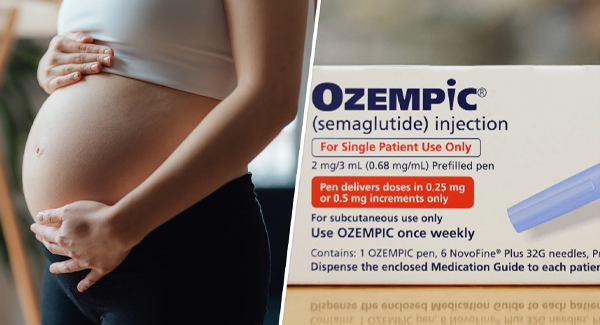The expert also outlined what we could be ‘seeing over the next few years’ in the health sphere
An NHS doctor has delivered his ‘hot take’ on why he believes weight-loss drugs are contributing to the rise of ‘Ozempic babies’.
Ozempic was first created to help persons with type 2 diabetes control their blood sugar levels by increasing the amount of insulin produced by the pancreas. And because the GLP-1 hasn’t been licensed in the UK for weight loss, thousands of obese people have resorted to products like Mounjaro and Wegovy, which have been approved by NICE, to feel better about their bodies.
The Medicines and Healthcare Products Regulatory Agency (MHRA) warns that these weight-management pills may interfere with contraception in addition to slowing down digestion and suppressing appetite.
Experts have claimed that people on the pill may find that their contraception isn’t being absorbed effectively if they’re also injecting with weight-loss drugs.

MHRA also advised women on these drugs to also use other forms of contraception, like condoms, especially during the first four weeks of treatment.
As well as possibly decreasing contraception absorption rates, these so-called ‘skinny jabs’ could potentially increase fertility rates, according to an expert.
Since then, author and NHS surgeon Dr. Karan Rajan has offered his thoughts on the alleged “Ozempic baby boom.”
He started by saying, “There have been reports of increased fertility in women taking some of these weight loss injections, including Olympic babies and Wegovy kids.”
Dr Rajan questioned if the ‘reduced absorption of some contraceptive medication’ was the reason behind the ‘Ozempic baby’ boom, or perhaps ‘improved insulin allowing for more fertility’.
He clarified in an Instagram video, “Also, some of those indirect variables include weight loss, greater confidence, libido, and desire to have more sex with a partner.” “In my opinion, regardless of weight loss, we will witness a rise in the usage of low-dose or microdose weight loss injections such as GLP-1 and GIP-agonists over the next few years.”
A research by the National Institutes of Health (NIH) found that reducing body weight can enhance sexual performance, and Lloyds Online Doctor said that lowering weight can boost libido.
Additionally, according to Brown University, a person’s weight has a significant impact on their body image and sense of self, and altering their way of life can significantly improve their mood.
“Think about the role of weight loss injections in the paradigm of improving fertility, independent of weight loss.”
But Dr. Daniel Drucker, a professor and researcher at the University of Toronto’s Mount Sinai Hospital and a pioneer in the study of GLP-1, told CNN that Dr. Rajan is not the only person who has noticed this: “If you start on these medicines and then you lose 5, 10, 15 percent of your body weight, very often, you will have an improvement in ovulation.”
Furthermore, physicians are uncertain if weight-loss medications affect these unborn “Ozempic infants,” which the Cleveland Clinic defines as a fetus conceived while taking the medicine.

“We don’t know the effect of early exposure … on the fetus,” said Dr. Jody Dushar, a physician focused on endocrinology and metabolism at Beth Israel Deaconess Medical Centre and an assistant professor at Harvard Medical School.
A spokesperson from Novo Nordisk said that Semaglutide injections, including Ozempic and Wegovy, should be ‘discontinued in women at least 2 months before a planned pregnancy’.
This is apparently ‘due to the long washout period for semaglutide’.
“Semaglutide should not be used during pregnancy. Women of childbearing potential are recommended to use contraception when treated with semaglutide,” they continued.
“In other pharmacology trials, semaglutide did not affect the absorption of oral medications (including the oral contraceptive medication ethinylestradiol and levonorgestrel) to any clinically relevant degree.
“Therefore, semaglutide is not anticipated to decrease the effect of oral contraceptives. Nonetheless, caution should be exercised when oral medications are concomitantly administered with semaglutide.”










